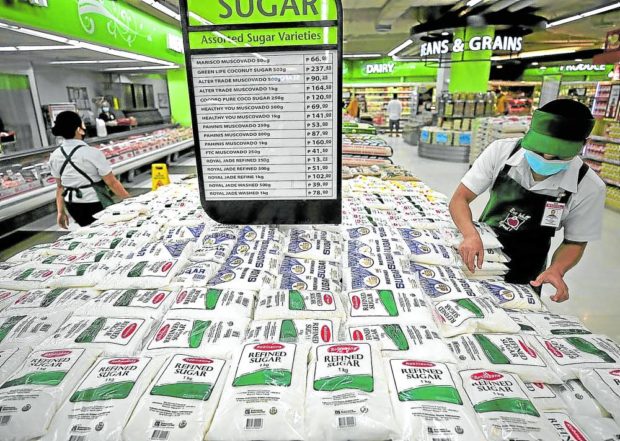Sugar planters reject government importation plan

STILL COSTLY | A grocery worker arranges sugar packs around a price reference board. (INQUIRER FILE PHOTO)
MANILA, Philippines — More stakeholders have moved forward to oppose President Ferdinand Marcos Jr.’s plan to allow the importation of refined sugar at the soonest possible time, saying such a move won’t pull sugar prices down.
The National Federation of Sugarcane Planters (NFSP) said sugar imports at this time would not depress steep prices of the sweetener, which remain at around the P100 per kilogram level.
“Thus, it is not advisable to import now. Because the imported sugar, which will arrive only after two or three months from now, will not address the present high prices caused by demand of Christmas season,” said NFSP president Enrique Rojas in a statement.

Seasonal pressure
Rojas said the holidays jacked up the prevailing prices of sugar. “After Christmas and New Year, when demand decreases, retail prices are also expected to decrease,” he added.He also said the average sugar price of P100 is “surprising” as mill-gate prices have been on a downtrend in the past two months.
“If some sectors are profiting from the artificially inflated retail sugar prices, it is definitely not the sugarcane farmers,” he added.
Instead of resorting to importation, the National Federation of Sugar Workers (NFSW) said the government should help domestic producers alleviate the rising cost of fertilizer and fuel if it is keen on lowering the selling price of sugar.
NFSW secretary general John Milton Lozande said the government should put a price cap on sugar products “so that these would not be manipulated by unscrupulous traders, a number of which are owned by big planters and millers themselves.”
“Other than the above, the government should not only strictly monitor compliance with minimum wage standards but also agree to a higher minimum wage for sugar workers, both in the field and in mills and refineries as they too suffer the high living costs caused by high inflation rates,” added Lozande.
Not entirely planters’ fault
Lozande mentioned that in Negros Occidental, for instance, the daily wage of cutting and loading sugarcane ranges from P280 to P350 per day, lower than the minimum wage of P410 per day.
Yet, fertilizer prices have skyrocketed to about P3,000 per sack from only P800 to P920 per sack previously, Lozande added.
Both Rojas and Lozande assured the public of sufficient supply of sugar for local consumption.
Stakeholders made the pronouncement as the Department of Agriculture (DA) issued an order asking the Minimum Access Volume (MAV) Advisory Council to immediately convene and expedite the importation of 64,050 metric tons of refined sugar through the MAV mechanism.
MAV system
MAV refers to the volume of a specific agricultural product that can be imported with a lower tariff. This is the minimum volume committed by the Philippines to the World Trade Organization.
The DA, which issued the directive at the President’s instructions, has expressed concern over the “high inflation rate” of sugar.
The annual inflation increment for sugars, confectionery, and desserts reached 38 percent in November, it said, citing the latest data from the Philippine Statistics Authority.
In Metro Manila, refined sugar is sold for as low as P70 per kg to as high as P112.35 per kg in supermarkets, based on the Sugar Regulatory Administration’s price monitoring report as of Dec. 2.
Meanwhile, in public wet markets in the metro, refined sugar is priced from P92 to P105 per kg.